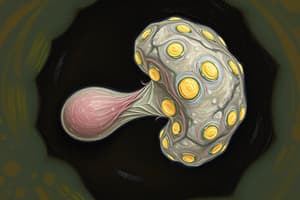Podcast
Questions and Answers
What is the primary purpose of sodium iodide (I-131)?
What is the primary purpose of sodium iodide (I-131)?
- To treat the malignancy of the thyroid gland (correct)
- To treat lung cancer
- To cure heart disease
- To enhance bone density
Sodium iodide (I-131) emits only alpha radiation.
Sodium iodide (I-131) emits only alpha radiation.
False (B)
What is the half-life of I-131?
What is the half-life of I-131?
8 days
Sodium iodide is used in small doses to detect the normal functioning of the __________ gland.
Sodium iodide is used in small doses to detect the normal functioning of the __________ gland.
Match the following applications of sodium iodide (I-131) with their corresponding doses:
Match the following applications of sodium iodide (I-131) with their corresponding doses:
What type of radiation is primarily responsible for destroying malignant cells in the thyroid tissue?
What type of radiation is primarily responsible for destroying malignant cells in the thyroid tissue?
The pH of sodium iodide solution is usually acidic.
The pH of sodium iodide solution is usually acidic.
What are the two hazardous components added to the injection formulation of sodium iodide to improve shelf-life?
What are the two hazardous components added to the injection formulation of sodium iodide to improve shelf-life?
Which of the following is NOT a common side effect of radiopharmaceuticals?
Which of the following is NOT a common side effect of radiopharmaceuticals?
Radioactive substances should be stored in containers that are not tightly sealed.
Radioactive substances should be stored in containers that are not tightly sealed.
Name one use of radioactive substances in medicine.
Name one use of radioactive substances in medicine.
Radiations are used for the sterilization of _____ media.
Radiations are used for the sterilization of _____ media.
Match the following applications of radiopharmaceuticals with their descriptions:
Match the following applications of radiopharmaceuticals with their descriptions:
What does the darkening of a storage container indicate?
What does the darkening of a storage container indicate?
The storage area for radioactive compounds should allow frequent visits.
The storage area for radioactive compounds should allow frequent visits.
What type of container should radioactive substances for parenteral use be kept in?
What type of container should radioactive substances for parenteral use be kept in?
Flashcards are hidden until you start studying
Study Notes
Sodium Iodide (I-131)
- Sodium iodide (I-131) is a radiopharmaceutical used primarily to treat thyroid gland malignancy.
- Available in various formulations, including solutions, capsules, and injections.
- Sodium iodide ionizes, emitting beta radiation (90%) and gamma radiation (10%).
Mechanism of Action
- Thyroid gland readily traps I-131 isotopes via a sodium/iodide symporter.
- I-131 is oxidized to iodine within the thyroid gland.
- Beta radiation emitted by I-131 destroys malignant thyroid cells.
Properties
- Sodium iodide solution is clear and colorless but may darken over time due to radiation.
- pH of the solution ranges from 7.5 to 9.0.
- Preservatives like benzyl alcohol and reducing agents like sodium thiosulfate are added to extend shelf life and prevent oxidation in aqueous formulations.
- The half-life of I-131 is 8 days.
Assay
- Assayed by comparing the activity of radioactive sodium iodide with a standard I-131 solution.
- Radioactivity is measured using a Geiger-Muller counter or scintillation detector.
- Typical dose of sodium iodide I-131 ranges from 5 to 1000 µCi, depending on the procedure.
Uses
- Small doses used to assess thyroid gland function.
- High doses used in thyroid gland malignancy therapy.
- Used to treat hyperthyroidism.
Common Side Effects
- Nausea.
- Vomiting.
- Neck tenderness and swelling.
- Dry mouth.
- Loss of taste.
Storage Conditions of Radiopharmaceuticals
- Radioactive substances should be stored in tightly sealed containers.
- Storage areas should restrict frequent access.
- Storage should comply with national and international regulations.
- Containers should be labeled appropriately to avoid misuse and adverse effects.
- Darkening of the container during storage does not indicate degradation of the radioactive substance.
- Parenteral radiopharmaceuticals should be stored in glass vials or ampoules to clearly visualize the content.
Pharmaceutical Applications of Radioactive Substances
- Used in medicine as therapeutic agents, diagnostic agents, research tools, and for sterilization.
Radiopharmaceuticals as Therapeutic Agents
- Used for therapeutic purposes, such as treating thyroid cancer and other conditions.
Radiopharmaceuticals as Diagnostic Agents
- Used for diagnosis procedures, such as imaging scans to evaluate organ function and identify abnormalities.
Radiopharmaceuticals in Research Studies
- Used in scientific research to study various biological processes, develop new drugs, and understand the effects of radiation.
Radiopharmaceuticals in Sterilization
- Used for sterilizing culture media, surgical instruments, and thermolabile biological substances.
Studying That Suits You
Use AI to generate personalized quizzes and flashcards to suit your learning preferences.



